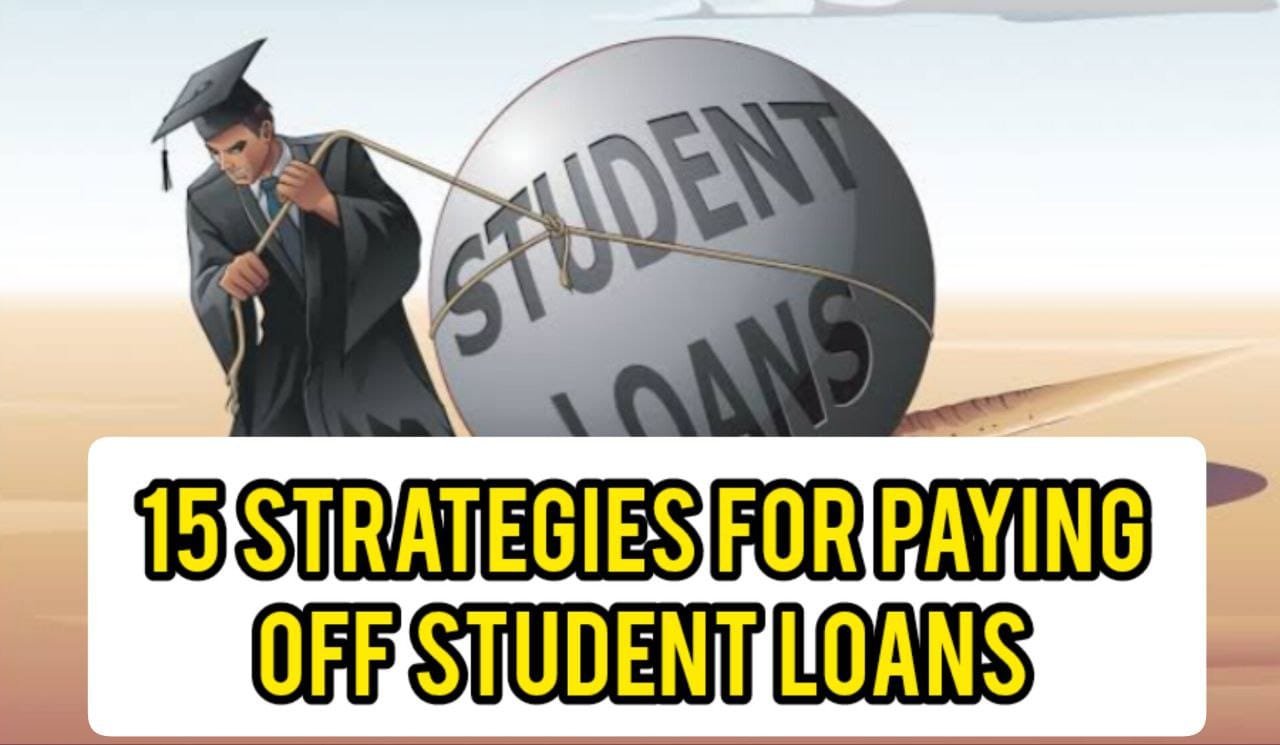Student loans are often a part of college life for millions of people. For many, loans make the difference between accessing higher education and not. However, the financial burden that comes along with student loans can feel like a heavy weight for years after graduation. If you’re looking for ways to reduce that burden, then this article is for you! Here, we’ll explore what student loans are, how they work, and share 15 practical, actionable strategies to help you pay off your student loans faster. Let’s dive in!
What Are Student Loans?
Student loans are a type of financial assistance designed to help students cover the costs associated with higher education, including tuition, textbooks, and living expenses. They differ from scholarships or grants because they have to be repaid, usually with interest. In general, two main types of student loans exist: federal and private loans.
Types of Student Loans
1. Federal Student Loans
Federal student loans are funded by the U.S. government and typically offer lower interest rates and more flexible repayment options than private loans. Common types of federal loans include Direct Subsidized Loans, Direct Unsubsidized Loans, and Direct PLUS Loans.
2. Private Student Loans
Private student loans come from banks, credit unions, or private lenders. They can cover expenses federal loans don’t, but they often come with higher interest rates and less flexibility in terms of repayment.
Why Do Student Loans Accumulate Interest?
When you borrow money, interest is the cost of borrowing. With student loans, the interest rate dictates how much extra you’ll pay on top of your original loan amount. Federal loans often have fixed rates, while private loans may have either fixed or variable rates. This interest can add up quickly, which is why paying off your loans faster can save you money in the long run.
15 Strategies for Paying Off Student Loans Faster
Ready to speed up your loan repayment? Let’s look at 15 proven strategies to help you pay off your student loans faster and reduce the interest burden.
1. Make Extra Payments When Possible
One of the simplest ways to chip away at your student loan balance is by making extra payments. Even a small additional payment each month can reduce your balance and save on interest.
Tip: Make sure to tell your loan servicer that you want the extra payment applied to the principal balance, not future payments.
2. Pay More Than the Minimum Payment
By paying more than the minimum required each month, you’ll reduce the principal balance faster. Even adding an extra $20 or $50 can make a significant impact over time.
3. Set Up Automatic Payments
Most lenders offer a small interest rate discount if you set up automatic payments. This discount might only be 0.25%, but every little bit helps, and it also ensures you never miss a payment.
4. Refinance Your Loans
Refinancing involves taking out a new loan with a lower interest rate to pay off your existing student loans. This can be particularly beneficial if you have high-interest private loans. However, refinancing federal loans can mean losing some federal benefits, so think carefully before going this route.
5. Choose a Shorter Repayment Plan
Many federal loans default to a 10-year repayment plan, but shorter plans are available. Opting for a five-year plan instead, if you can afford the higher payments, will reduce the amount of interest you pay over the life of the loan.
6. Use Windfalls to Your Advantage
If you receive unexpected money, such as a tax refund, bonus, or gift, consider putting it toward your student loan debt. Windfalls can make a substantial dent in your balance and help you pay off your loans faster.
7. Budget for Your Loan Payments
Create a budget that includes your loan payment as a top priority. By treating it as a fixed, non-negotiable expense, you’re more likely to stay on track and avoid missed or delayed payments.
8. Avoid Extending Repayment Terms
Many federal repayment plans offer extended terms, but these can end up costing you more in interest over time. If you want to pay off your loans faster, stick with shorter terms or look for other ways to increase your monthly payments.
9. Consolidate Federal Loans
Federal loan consolidation combines multiple federal loans into one loan with a single interest rate. This won’t necessarily lower your interest rate, but it can simplify your payments, making it easier to stay organized and consistent with payments.
10. Use the Debt Snowball Method
The debt snowball method focuses on paying off the smallest loans first while making minimum payments on larger ones. This method can boost motivation, as paying off smaller debts often feels rewarding and keeps you motivated to tackle larger loans.
11. Try the Debt Avalanche Method
Unlike the snowball method, the debt avalanche method prioritizes paying off loans with the highest interest rates first. This approach saves you more money on interest in the long term, even if it takes longer to see progress.
12. Cut Back on Expenses
Tightening your budget by cutting unnecessary expenses can free up more money for loan payments. Think about cutting out subscriptions, eating out less, or finding ways to lower other monthly expenses.
13. Increase Your Income with a Side Gig
Taking on a side job or freelance work can provide additional income that you can put directly toward loan payments. From tutoring to freelancing or rideshare driving, extra income can help you pay off loans more quickly.
14. Apply for Loan Forgiveness Programs
Certain professions, such as teaching or public service, may qualify you for loan forgiveness programs like Public Service Loan Forgiveness (PSLF). These programs forgive part or all of your student loans if you meet specific requirements.
Tip: Research loan forgiveness programs to see if you’re eligible. It’s a great way to reduce or eliminate your loan balance.
15. Stay Informed and Reevaluate Regularly
Interest rates and repayment options can change, so it’s essential to stay informed about your loans. Check in with your lender or servicer periodically and reassess your repayment strategy. Adjustments may help you stay on track and pay off your loans faster.
Pros and Cons of Paying Off Student Loans Faster
Understanding the pros and cons of paying off student loans faster can help you decide if these strategies are right for you.
Pros:
- Reduced Interest Costs: Paying off your loans quickly can save you thousands of dollars in interest.
- Freedom from Debt: Becoming debt-free faster offers peace of mind and financial flexibility.
- Better Credit Score: Reducing your debt can improve your credit score, making it easier to qualify for future loans.
Cons:
- Limited Disposable Income: Focusing on loan repayment might limit money for other goals or emergencies.
- Potential Loss of Tax Benefits: Some student loans offer tax benefits. Paying off too quickly might reduce these deductions.
- Risk of Burnout: Aggressive repayment plans can feel overwhelming, especially if you’re sacrificing too much.
Conclusion
Paying off student loans can be a daunting task, but with the right strategies, you can take control of your debt and pay it off faster. From making extra payments and refinancing to considering forgiveness programs, there are plenty of options to explore. Choose a plan that fits your budget, lifestyle, and financial goals, and remember, every little bit helps. The sooner you start, the sooner you can enjoy financial freedom!
FAQs
Can I pay off my student loans while still in school?
Yes, you can! Paying off even a small amount while still in school can help reduce your loan balance and future interest costs.
How can I avoid defaulting on my student loans?
To avoid default, set up a budget, communicate with your lender about repayment options, and consider an income-driven repayment plan if necessary.
Does refinancing federal student loans make sense?
Refinancing can save you money if you have high-interest loans, but it may result in losing federal loan benefits like deferment or forbearance.
Are there any disadvantages to making extra payments?
There are generally no disadvantages, but check with your lender to ensure they apply extra payments to your principal balance rather than pre-paying future installments.
What happens if I don’t qualify for loan forgiveness?
If you don’t qualify, consider other strategies like refinancing, consolidating, or budgeting for extra payments to pay off your loans faster.

Don has over 5 years of experience as an SEO expert, writer, and digital media professional. He has led teams to create engaging news broadcasts and has covered major news stories. Hems has worked with top outlets like Bloomberg, Yahoo! Finance, and Fox Business Network, focusing on insurance, business, and finance. His skills combine SEO knowledge with strong storytelling, making him an expert in creating content that is original, optimized and informative.

